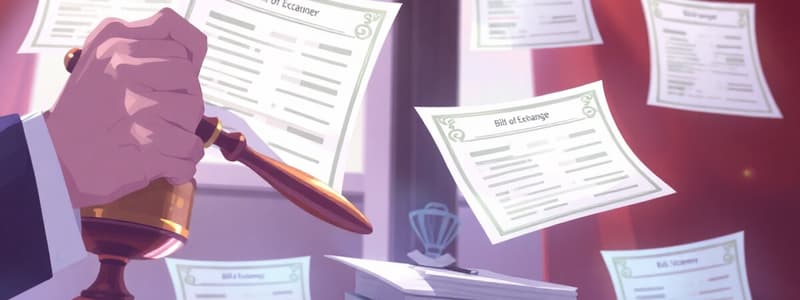Podcast
Questions and Answers
What is the primary reason for the diminished practical significance of notary public protests for financial instruments, as indicated in the text?
What is the primary reason for the diminished practical significance of notary public protests for financial instruments, as indicated in the text?
- Increased demand for notary services in other areas, diverting attention from protests.
- Changes in notary public licensing requirements making protests more difficult to perform.
- A decrease in international trade, which historically relied on bills of exchange.
- The development of modern financial regulations that have superseded the need for protests. (correct)
According to the provided text, which category of notaries public is legally permitted to perform protests on financial documents in California?
According to the provided text, which category of notaries public is legally permitted to perform protests on financial documents in California?
- Any notary public duly licensed and active within the state of California.
- Notaries public employed by a financial institution and acting within their job responsibilities. (correct)
- All notaries public, provided they charge a state-mandated fee for the service.
- Only notaries public who have received specific certification in financial law.
Why is there no separate fee prescribed for notary publics performing protests when employed by a financial institution, as described in the text?
Why is there no separate fee prescribed for notary publics performing protests when employed by a financial institution, as described in the text?
- State law mandates that protests must be offered as a free public service.
- Fees for protests are indirectly charged through other banking service fees.
- The cost is covered by a general fund allocated to all notary services.
- Performing protests is considered a standard part of their employment duties for the financial institution. (correct)
Which of the following financial instruments are specifically mentioned in the text as being subject to notary protests?
Which of the following financial instruments are specifically mentioned in the text as being subject to notary protests?
Prior to modern financial regulations, what was the likely primary purpose of requiring a notary public to protest the nonacceptance or nonpayment of a bill of exchange?
Prior to modern financial regulations, what was the likely primary purpose of requiring a notary public to protest the nonacceptance or nonpayment of a bill of exchange?
If a self-employed notary public in California, not affiliated with any financial institution, is asked to protest a promissory note, what would be the most accurate course of action based on the text?
If a self-employed notary public in California, not affiliated with any financial institution, is asked to protest a promissory note, what would be the most accurate course of action based on the text?
Which of the following best describes the evolution of notary public duties related to protests in the context of financial transactions?
Which of the following best describes the evolution of notary public duties related to protests in the context of financial transactions?
What is a key characteristic that distinguishes a notary public who is authorized to perform protests from a general notary public in California?
What is a key characteristic that distinguishes a notary public who is authorized to perform protests from a general notary public in California?
What can be inferred about the complexity of financial transactions in the era before modern regulation, based on the notary's duty to perform protests?
What can be inferred about the complexity of financial transactions in the era before modern regulation, based on the notary's duty to perform protests?
Which scenario aligns with the conditions under which a notary public in California is permitted to perform a protest, according to the text?
Which scenario aligns with the conditions under which a notary public in California is permitted to perform a protest, according to the text?
Flashcards
What is a protest?
What is a protest?
A formal statement by a notary public attesting to the dishonor of a bill or note.
Who can perform protests?
Who can perform protests?
Primarily financial institution employees handle protests of dishonored financial documents.
Protest fee?
Protest fee?
No specific fee is prescribed because it's part of their job within the financial institution.
Study Notes
- A notary public's duty to protest the nonacceptance and nonpayment of foreign or inland bills of exchange, or promissory notes is an outdated mechanism.
- This mechanism existed before modern financial transaction regulations.
- Only notaries employed by financial institutions can perform protests.
- They must be acting within the scope of their employment.
- This applies to specific financial documents described by California law.
- Since only employed notaries can perform protests, there is no prescribed fee for this service.
- It is considered part of the notary public’s service to the financial institution.
Studying That Suits You
Use AI to generate personalized quizzes and flashcards to suit your learning preferences.




